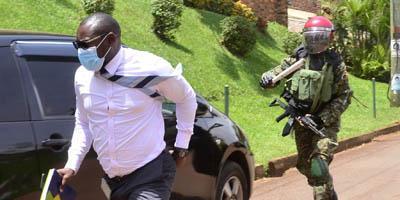The 2021 Ugandan presidential election was a fierce competition between Yoweri Kaguta Museveni, who has been in power since 1986, and a popular musician turned political figure, Robert Kyagulanyi Ssentamu, known by his stage name Bobi Wine. The election was characterized by an unprecedented amount of political violence, including riots, arrests, and media suppression.
Uganda has long struggled with its pursuit of democracy since it gained independence from the United Kingdom in 1962, plagued with corruption and abuse of power. Widespread violence and civil unrest have long been common around election season.
Museveni’s competitor in that election, Bobi Wine, the leader of the National Unity Platform, has been dubbed the “Ghetto President” because of his upbringings in the Kamwokya slums of Northern Kampala. Wine’s career began in the early 2000s and his music is characterized by politically conscious lyrics urging the country’s leaders to address issues of social inequity, poverty, maternal health, domestic violence, and HIV/AIDS.
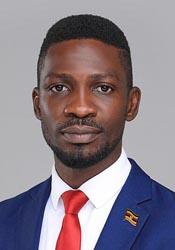
Wine also coined the term “edutainment” to categorize his music, which combines elements of educational messages with entertaining, catchy, beats. His involvement in politics began in 2017 when he announced his candidacy for parliament. As a person who has been especially popular amongst Ugandan youth, in his first address as an MP Wine expressed that he was “here to give young people confidence.”
What is at stake?
Museveni’s years in office have not been without criticism. In 2005, the constitution was amended in order to remove term limits, which in turn allowed him to run for a third, fourth, fifth, and later sixth consecutive term. In 2017, the constitution was amended again in order to remove an age limit for presidential candidates, which eventually led to a brawl on the parliament floor. Despite this, Museveni has gained some popularity for his strong convictions, and his rise to power demonstrates this well.

Uganda has one of the world’s youngest populations, with over 78% of the population being below the age of 30. This means that most of the country has never known a leader other than Museveni, nor have any memory of Museveni’s involvement in the Ugandan Bush War that propelled Museveni to power.
Wine is eager to change this reality. Many young Ugandans identify with him, especially considering his humble upbringings and his deep roots in the music industry. But relatability with Wine went well beyond catchy tunes, seeing as Wine’s populist, anti-corruption, and pro-democracy platform managed to attract an unprecedented amount of support from Ugandans. While many candidates have risen to challenge Museveni’s seat, very few have had such an impact on Ugandan youth. Kizza Besigye, for example, has run against Museveni many times, but has struggled to mobilize the country’s young voters.
Arrests
Arrests are not uncommon around election time in Uganda. Wine and his entire campaign team of ninety people were arrested after campaigning in Kalangala, a district off the coast of Lake Victoria. Wine was accused of breaching a campaigning ban enacted in response to Covid-19, although Kalangala was not identified as a banned district. Another opposition candidate, Patrick Amuriat, was arrested nine times for traffic and road safety violations.
Reporteurs sans frontières (Reporters Without Borders) also reported 17 press freedom violations including arbitrary arrests of journalists. The documentary filmmaker Moses Bwayo was hospitalized on November 5 after being shot at near point-blank range by police while documenting Wine’s campaign trail.
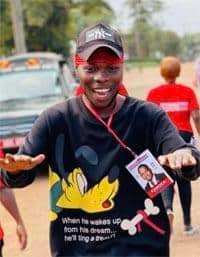
Polling agents were also subject to arrest. I spoke with Pius Jadwar, an activist who worked alongside Bobi Wine on the campaign trail, about his experience on election day: “I was deployed somewhere in Kampala and while I do not wish to disclose the location, what happened to my polling station was the same thing that happened to every polling station in Uganda. People were being arrested. Ugandans who subscribed to the NUP were being arrested in broad daylight. Even a lot of Ugandans who were polling agents for the NUP were being arrested after the elections had concluded.”
Three CBC journalists were also deported ahead of the elections for conducting “business activities” while travelling on a tourist visa, despite having the proper media credentials and seeking advice from the Uganda High Commission in London and the Media Council of Uganda prior to departure. In response to the deportations, the government spokesperson and executive director of the Uganda Media Centre Ofwono Opondo took to Twitter to share his thoughts: “Do we really need you to scrutinise our electoral process to qualify as credible? …Uganda reserves the right to admit foreign persons including journalists. Good stay where you are.”
Such violence and censorship is nothing new during elections. On August 13, 2018, while Wine was campaigning in Northern Uganda, his driver, Yasin Kawuma, was shot dead in their vehicle. On November 18, 2020, Ugandan security forces clamped down on protests in response to Wine’s arrest, which supposedly came after Wine was preparing to hold a campaign rally in Luuka, a district in Eastern Uganda. Police maintained that the arrest was a result of breached Covid-19 regulations prohibiting any presidential candidates to address more than 200 people at a single rally.
While at least 54 people were killed in the unrest, the government later announced that only the 22 who were killed by stray bullets would be compensated, and the other 32 would be considered rioters with no compensation. As of November 21, 2022, the Leader of Opposition Mathias Mpuuga confirmed that the government had yet to compensate the deserving families, while also pointing out that the police had not released the published investigation into holding the perpetrators of the attack accountable.
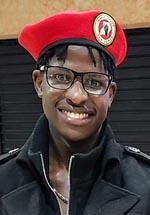
I spoke with Steven Kabuye who witnessed the riots for his account: “So we are in town and then the violence breaks out, and then we are trying to get out of town. So my hands are up, showing them that I am unarmed and just trying to go home. All of a sudden, a guy parks, gets a gun out of the boot, and starts shooting. In the next minute, I just saw the boy that was in front of me, in fact, I think he was something like seventeen years old; he fell down, died all of a sudden. Just imagine that trauma. The President came out and said that they were stray bullets that killed him and everyone believed it. We saw videos online where people were being shot. Two ladies were shot beside the road by a convoy that was moving.”
Internet blackout
The 2021 general election, characterized as an internet blackout the night before election day, was in place for nearly five days. The government explained the blackout as a necessary measure to prevent foreign interference in electoral affairs, while the opposition alleged that the mass switchoff made it impossible to communicate with observers at polling stations.
Digital rights advocates posited that the blackouts were a deliberate effort to keep Ugandans and the rest of the world in the dark during election week. The shutdown included e-commerce, app-based transit services, and electronic money transfers, and it is estimated that the shutdown cost the Ugandan economy around USD $9 billion. Social media platforms were also banned as authorities maintained that they were biased. The shutdown prompted doubts from critics regarding the validity and authenticity of the presidential results.
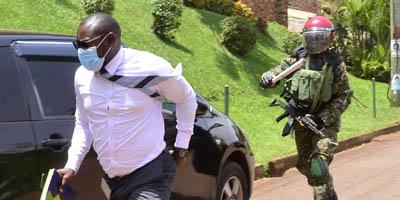
Kabuye described some of these concerns. “In 2021, Facebook was put off, but at least Whatsapp was still on. By this time around, all were off. They totally put everything off whereby the wifi could not work, the mobile (cellular data), everything was off. So Uganda was in a blackout, meaning that you had to make a call directly to someone out of Uganda if you wanted to connect with them.
“So that is why we are asking ourselves, where the chairperson of the Electoral Commission is reading these things from? Because you can’t tell me that you are reading things from a district that is 800 miles away, and you have just concluded the elections while the internet is off. Where are you getting the results you are reading?”
While only around 24% of Ugandans are internet users, many opted to bypass the shutdown via Virtual Private Networks (VPN). Curious about the efficacy of the blackout, I asked Andrew Mwenda, a Ugandan journalist, about his experience.
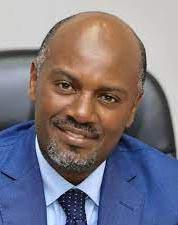
“Four and a half million Ugandans downloaded VPN within the first day, so essentially many people did bypass the ban by accessing social media via VPN,” he said. “The shutdown of the internet was a reflection of the fact that the government did not understand that they could use the internet, the same social media, much more effectively within the opposition to promote their cause. So there was the failure of the government to understand the power of social media and to develop a strategy to exploit the platforms of social media for its own benefit. That was a disaster.”
Women at the centre of electoral violence
There is also a gendered aspect to electoral violence in the Ugandan case – a nuanced corner of electoral violence in which women are disproportionately subject to harm. A 2022 qualitative report published by United Nations Women found that women were discouraged from participating in elections, be it as voters, candidates, election administrators, or surveyors. The discouragement ranged from overt threats of divorce, social exclusion, and domestic abuse to more implicit threats in the form of psychological violence and taunting.
In the lead-up to the 2021 election, the EU approved a grant of EUR 1.1 million to support a project of the Women’s International Peace Centre called the Women’s Situation Room. The Women’s International Peace Centre is an international feminist organization which aims to empower female leadership, amplify the voices of women, and deepen activism. The Women’s Situation Room works with 1,500 women and 1,500 youth across thirty districts to monitor and detect spikes in violence in the lead up to, during, and after elections. The Women’s Situation Room was first launched in Libya in 2011 and has since been implemented in Kenya, Sierra Leone, and Senegal. It works to train election observers and set up 24-hour hotlines for incident reports and works with women’s rights organizations to monitor trends in domestic violence and other forms of abuse during election seasons.
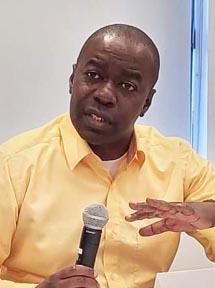
I spoke with Yasin Kakande about his reporting on the Women’s Situation Room and the importance of taking a gendered approach when evaluating electoral violence: “There has been so much violence against women, so women have been at the center of this violence. The Women’s Situation Room was making a situation room for monitoring the elections… which bring along violence, especially to women, and it’s never discussed. It’s always swept under the rug. Their focus was to categorize the violence against women during elections into two types. The first was like a family level, a way of maybe husbands disagreeing with wives on the presidential candidate or any political candidate or political ideas, and then it ends up in violence. The other was mostly about the government itself, the government torturing women during elections. Governments, especially in Africa, may look at elections as another kind of war; they will use so much excessive force to make sure that they stay in power. So anything that tries to obstruct their stay in power is going to be met with excessive force.”
International response
The European Union expressed concern surrounding the “continued harassment of political actors and parts of civil society,” but opted not to send an Election Observer Mission to Uganda ahead of the 2021 elections. The EU usually sends the largest team of observers out of any similar group; 94 monitors had been sent to the last election, in 2016. A 2018 EU report showed that not one of the 30 recommendations made by observers had been implemented in the 2016 election, which heavily influenced the decision not to send a mission in 2021.
Russia and China were quick to congratulate Museveni on winning a sixth term, alongside nearby countries Kenya, Burundi, and Tanzania. Both Russia and China have historically maintained a friendly and cooperative relationship with Uganda. Neither the EU nor the United States congratulated Museveni on his victory, whereas the UK sat somewhere in the middle: welcoming Museveni’s re-election while emphasizing concerns over the political climate and electoral process.
I asked Yasin Kakande about the dynamic between Western powers and Ugandan leaders. “I think that for elections in countries like Uganda to make sense, the most important thing is that we have to address European and American imperialism,” he told me. “We need to ask them to stop enabling [these leaders]. Unless they come to realize that we also have a right to live, and that it’s not a privilege to live when you are in Uganda, this should be counted and they should not celebrate someone who has killed his way into power again,”.
What does the future hold?
While Museveni is eligible to run in 2026, he has been preparing his son Muhoozi Kainerugaba to take his position as the biological clock runs out. Kainerugaba announced his intentions on Twitter, where he is quite active: “You have wanted me to say it forever! Okay, in the name of Jesus Christ my God, in the name of all the young people of Uganda and the world and in the name of our great revolution, I will stand for the Presidency in 2026!” He also credited with helping repair relations with Rwanda but, as a general in the military, he had a previous role as the commander of Uganda land forces until he was removed from the position after threatening to invade Kenya. He later said that he was joking.
I asked Yasin Kakande, an author and journalist from Uganda who now lives in the US, what it will take to maintain a peaceful future. He emphasized the West’s role in enabling leaders like Museveni. “The most important thing that we have to address is European and American imperialism. We need to ask them to stop enabling these dictators. If the President knows that he can kill and then get congratulated by the United Kingdom, that was a big cover up. They will do it again.”
Kakande also spoke about the importance of the fatalities from the November riots: “Can you imagine if these fifty-four people were killed anywhere else, or even if only four people were, in any election? No, they would not call them free and fair elections. This stance of calling the Ugandan elections after the killing of fifty-four people that had been reported was an utter disregard of the human life of Ugandan people.”
When asked about Kainerugaba, Steven Kabuye reflected on the history of Uganda’s leaders and proposed an alternative: “This is a son that has grown up in the same system that that was running. Nothing will change. I believe we need to change in Uganda. If elections are to come, and if I’m to participate in the elections again in Uganda, they should be totally different candidates. Not people that have been in the system right now, like Museveni trying to impose on us that his son should be the next president of Uganda.”
